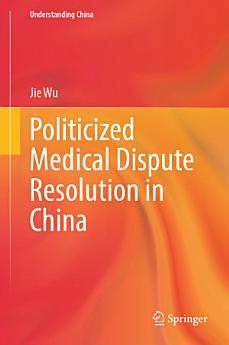Politicized Medical Dispute Resolution in China
Jie Wu
ઑક્ટો 2024 · Springer Nature
ઇ-પુસ્તક
172
પેજ
reportરેટિંગ અને રિવ્યૂ ચકાસેલા નથી વધુ જાણો
આ ઇ-પુસ્તક વિશે
This book investigates the politicization process of social dispute resolution and its unintended consequences, under the context of over 70 percent of China’s public hospitals have experienced hospital violence, with patients acting violently toward medical workers to express anger, protect their rights, or monetary reasons. The examination of interactions between patients, hospitals, and government representatives in China is based on fieldwork conducted in a Chinese mega-city from 2015 to 2017, combining over 700 archival mediation cases, 156 hospital violence cases and their legal outcomes, and 72 in-depth interviews with patients, mediators, and healthcare professionals. It examines the rise of mediation and finds how the party-state utilizes the traditional mediation channel to address emerging social disputes, and the art of persuasion in mediation and finds how political stability and moral concerns influence and shaped their strategies and mediation outcomes. The first-hand data and valuable archival documents help depict citizens’ social dispute resolution process and reflect another facet of non-electoral political participation in China, also enriching the understanding of evolving government strategies in dispute resolution. This book is reader-friendly and could engage a wide and dynamic audience of researchers, healthcare professionals, and readers interested in medical sociology, regional study, or political participation in China.
લેખક વિશે
Dr. Jie WU is assistant professor of political science at the Fudan University. She received Ph.D. from the University of Hong Kong. She obtained her B.A and M.A (Political Science) degrees from Fudan University. Her research interests revolve around health policy, contentious politics, and civil society in China. Her prior research and study were supported by the Swire scholarship and Harvard Yenching Institute.
આ ઇ-પુસ્તકને રેટિંગ આપો
તમે શું વિચારો છો અમને જણાવો.
માહિતી વાંચવી
સ્માર્ટફોન અને ટૅબ્લેટ
Android અને iPad/iPhone માટે Google Play Books ઍપ ઇન્સ્ટૉલ કરો. તે તમારા એકાઉન્ટ સાથે ઑટોમૅટિક રીતે સિંક થાય છે અને તમને જ્યાં પણ હો ત્યાં તમને ઑનલાઇન અથવા ઑફલાઇન વાંચવાની મંજૂરી આપે છે.
લૅપટૉપ અને કમ્પ્યુટર
Google Play પર ખરીદેલ ઑડિઓબુકને તમે તમારા કમ્પ્યુટરના વેબ બ્રાઉઝરનો ઉપયોગ કરીને સાંભળી શકો છો.
eReaders અને અન્ય ડિવાઇસ
Kobo ઇ-રીડર જેવા ઇ-ઇંક ડિવાઇસ પર વાંચવા માટે, તમારે ફાઇલને ડાઉનલોડ કરીને તમારા ડિવાઇસ પર ટ્રાન્સફર કરવાની જરૂર પડશે. સપોર્ટેડ ઇ-રીડર પર ફાઇલો ટ્રાન્સ્ફર કરવા માટે સહાયતા કેન્દ્રની વિગતવાર સૂચનાઓ અનુસરો.








